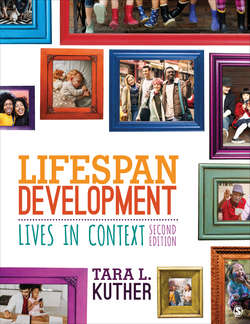Читать книгу Lifespan Development - Tara L. Kuther - Страница 69
На сайте Литреса книга снята с продажи.
Information Processing Theory
ОглавлениеA developmental scientist presents a 5-year-old child with a puzzle in which a dog, cat, and mouse must find their way to a bone, piece of fish, and hunk of cheese. To solve the puzzle, the child must move all three animals to the appropriate locations. How will the child approach this task? Which item will she move first? What steps will she take? What factors influence whether and how quickly a child completes this task? Finally, how does the 5-year-old child’s process and performance differ from that of children older and younger than herself?
Table 1.4
The problem described above illustrates the questions studied by developmental scientists who favor information processing theory, which posits that the mind works in ways similar to a computer in that information enters and then is manipulated, stored, recalled, and used to solve problems (Halford & Andrews, 2011). Unlike the theories we have discussed thus far, information processing theory is not one theory that is attributed to an individual theorist. Instead, there are many information processing theories, and each emphasizes a different aspect of thinking (Callaghan & Corbit, 2015; Müller, Kerns, Müller, & Kerns, 2015; Ristic & Enns, 2015). Some theories focus on how people perceive, focus on, and take in information. Others examine how people store information, create memories, and remember information. Still others examine problem solving—how people approach and solve problems in school, the workplace, and everyday life.
According to information processing theorists, we are born with the ability to process information. Our mental processes of noticing, taking in, manipulating, storing, and retrieving information do not show the radical changes associated with stage theories. Instead, development is continuous and entails changes in the efficiency and speed with which we think. Maturation of the brain and nervous system contributes to changes in our information processing abilities. We tend to become more efficient at attending to, storing, and processing information over the childhood years and to slow over the adult years (Luna, Marek, Larsen, Tervo-Clemmens, & Chahal, 2015). Experience and interaction with others also contribute by helping us learn new ways of managing and manipulating information. We naturally engage in information processing throughout our lives. We will discuss these changes and their implications for children, adolescents, and adults in later chapters.
Information processing theory offers a complex and detailed view of how we think, which permits scientists to make specific predictions about behavior and performance that can be tested in research studies. Indeed, information processing theory has generated a great many research studies and has garnered much empirical support (Halford & Andrews, 2011). Critics of the information processing perspective argue that a computer model cannot capture the complexity of the human mind and people’s unique cognitive abilities. In addition, findings from laboratory research may not extend to everyday contexts in which people must adapt to changing circumstances and challenges to attention (Miller, 2016).
